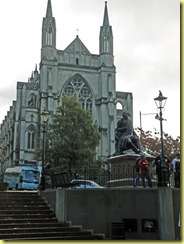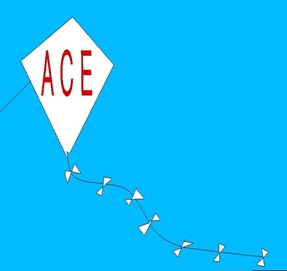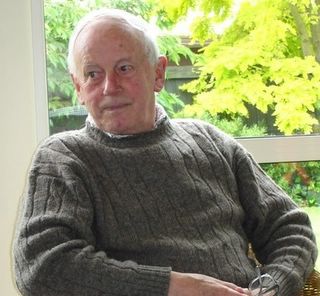Billy Molloy looked nervously across at his wife as she slammed the last dish in the cupboard. The kids were in bed, thank God, all except Ngaire of course. And where the hell was she on a filthy night like this? Safe in the pictures at Greymouth, as she’ll probably try to tell us? Or up on the Taylorville back road with that young Mitchell in his 1953 Velox?! It’ll be a bloody miracle if she gets to seventeen without a disaster.
Rita Molloy, stolid and miserable, poked the fire unmercifully, picked up her knitting, and settled down with the 3YZ Request Session as if Billy didn’t exist. Nice boy, that Terry Mitchell – nice family altogether – she could do a lot worse. Oh, yes, my Ngaire can look after herself. Even when her husband got up to peer under the water-marked holland blind, she didn’t flinch.
The steady three-day rain was still tinning away on the roof, gutters spilling down past the window to run under the house, and a huge reflecting pool of black splashing in the pile of coal at the gate. He could just see the misty lemon blob of the nearest street light and the downward driving lines of the familiar rain.
She won’t care if I go along to the pub. Won’t miss me, anyway. Better than sitting here chained to the kennel. Down in the mine all day, wet walls, sweaty, shiny workmates, all grunts and heaves, soggy sandwiches and thermos tea, - - pick, shovel,fuse,blast, drill and sweat! What for? To sit here with more grunts from her, and the water trying its best to come straight through the bloody roof. Aw, bugger it!
Rita shrugged out a knowing derisive snort as he grabbed for his oilskin behind the door. “Down to Wallsend for a jug” was quite redundant, and “Won’t be long” was unconvincing. She never was much of a girl for the pub.
There was the usual crowd in the bar, long after most of the pubs in the country had closed, and Roy Williams, the pubkeeper, leaned over all confidential-like, tea-towel over his shoulder. Heard about the new cop at Taylorville? Yeah, came over all cobbery, told me to close at eleven and he wouldn’t worry me. Eleven be buggered, let ‘im bloody try! The usual, Billy? O.K. - comin’ up.
The smoke was thick in the little square room, big villa windows onto the verandah, blinds pulled hard down, no outside lights, and the good old phone to warn you of the ‘flying squad’ as it shot through Kaiata or Stillwater.
Like a club it was, with the buzz and shout of the beer-talk, the loud-mouthed skite and pickled confidences, man to man, arm around the neck, “cos I trust y’ see?”, but more to keep the balance really. One lot of regulars played 45’s under the unsubtle light, the whole rowdy scene a going concern, good for the pub, good for the miners, the real social life of the Coast.
Then there was one long blast of the front door-bell. The noise stuttered, dwindled and was gone. It’s that new cop! Quick, out the back! Says Roy.
It’ll be a bit wet, but it won’t be for long. Billy fairly scampered out with the others in single file, jugs, glasses and all, Roy swabbing the bar like a flash, two of the Ngahere lads grabbing brooms, and the scene was set.
Over the back porch went the others, straight into the dark,damp,towering bush, up the wet, black, earthy bank, pulling on grass and supplejacks, swearing at blackberry and lawyer, grabbing the sticky, dirty tree-trunks, as they scurried for perfect cover in the night.
And there they crouched facing the pub, as the rain hammered down on the sheds and lean-to, pouring, soaking and dripping through the heavy leaves, into their hair, down their necks, as they pulled up their coat collars in vain. Someone was hushed as he started to abuse the new cop.
It seemed like hours, and Billy felt he was still down the mine – only this was worse. In the bush in the rain at midnight surrounded by fools like himself. But they all knew the drill. Roy would pitch a yarn about leaving the cleaning-up till pretty late, offer the policeman a drink, or even a bottle of Scotch to keep him sweet, see him out the front, then call them all back in to continue the night. What bloody fools we’ll all look at home, back from the pub like drowned rats! Billy could already hear Rita’s biting wisdom, and wished he’d stayed with the Request Session.
Then Roy’s voice! O.K. Come on in! It must’ve been a false alarm. There wasn’t even a car!
Then the swearing really started, as they trooped crazily in, shaking themselves in the hall as the lights came on, back to the bar for an hour or two and the roaring fire. Like Billy to a man, no-one was wife-bound just yet for a while. It came as quite a surprise to most of them there when the last man in shut the door quietly behind him, turned the key in the lock, and took their names and addresses.
Billy Molloy often thought about that rainy night in the bush . . . . “He didn’t last long, that new cop, and anyway, we never got our names in the paper like they did over the hill. All a bit of a dag really.” Rita Molloy always reckoned they were a bit tough on him. “What’s wrong with making you all obey the law just for once in your life? And it’s only for boozing!” Never was much of a girl for the pub.



